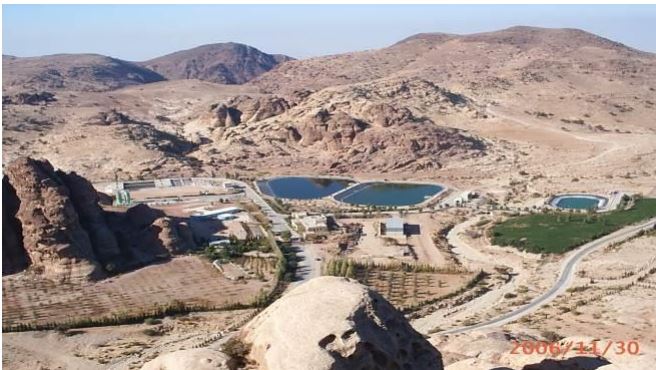The main goal of the proposed expansion of the waste water reuse project at Wadi Mousa is to maximize the reuse of waste water treatment plant effluent as a community adaptation method to climate change where the reuse of reclaimed water can be demonstrated to be a productive, economical, reliable, environmentally safe for sustainable irrigated agriculture that can replace the use of fresh water supplies (as ground water aquifers are already under stress in Jordan due to over abstraction).
The primary aim of this project is to develop the sustainability of waste water reuse activities and on-farm integrated agriculture in Wadi Mousa as a mean of climate change adaptation. The project has following components and sub-goals:
- Integrate reclaimed water use in fodder production; fodder production will be used as sheep feed. Feedstuff produced from each family holding (alfalfa and fodders) will be utilized to feed the flock.
- Propagation and redistribution of endangered plant species, medical and herbal plants production and beekeeping for honey production. Training selected farm leaders to become experts on beekeeping production and to disseminate their knowledge to the rest of the community.
- Optimize waste water reuse for irrigated agriculture (alfalfa plantation areas) as a mean of climate change adaptation, install and replace drip GR-lines (useful life 5 years), maximize irrigated area through soil salinity management, and maximize the economic return per m3 of reclaimed water used for irrigation.
- Help establish integrated on-farm agriculture through the introduction of permaculture concept to the farmers.
- Develop effective propagation methods for important endangered and endemic native Jordanian plants and protecting endanger Wadi Mousa native plants.
- Community resilience and adaptation to climate change through improved household generated income of poverty pockets and nomadic local Bedouin communities at Wadi Mousa.
Learn more
- Jordan TV video (in Arabic): Building Climate Resilience for Water and Agriculture
- The Jordan Times (July 13, 2016): 9.2 million project launched to tackle climate change
| Project Component 1: Climate change adaptation of agricultural & water sector through technology transfer | US$ 5,900,000 |
| Project Component 2: Capacity building at both the national and local/community levels respectively, knowledge dissemination, policy and legislation mainstreaming | US$ 1,900,000 |
| Project execution cost | US$ 703,000 |
| Total project cost | US$ 8,503,000 |
| Implementing Entity Project Cycle Management Fee | US$ 723,000 |
| Grant Amount | US$ 9,226,000 |
Project Documents
| Attachment | Type | Size |
|---|---|---|
| Project document | 14 MB | |
| Inception Report | 679 KB | |
| PPR1 (for web) | XLSX | 524 KB |
| PPR2 (for web) | XLSX | 587 KB |
| PPR3 (for web) | XLSX | 467 KB |
| Mid-term evaluation report | 643 KB | |
| Other project order | 20 KB | |
| PPR4 (for web) | XLSX | 311 KB |
| PPR5 (for web) | XLSX | 276 KB |
| Other project order | 251 KB | |
| PPR6 (for web) | XLSX | 399 KB |
| PPR7 (for web) | XLSX | 337 KB |



